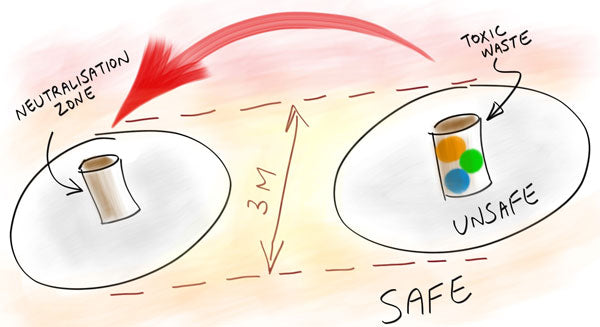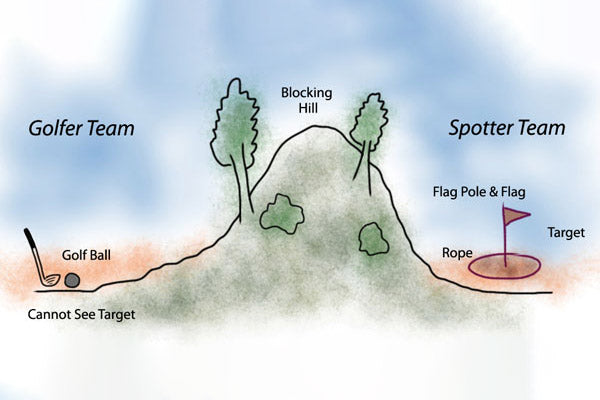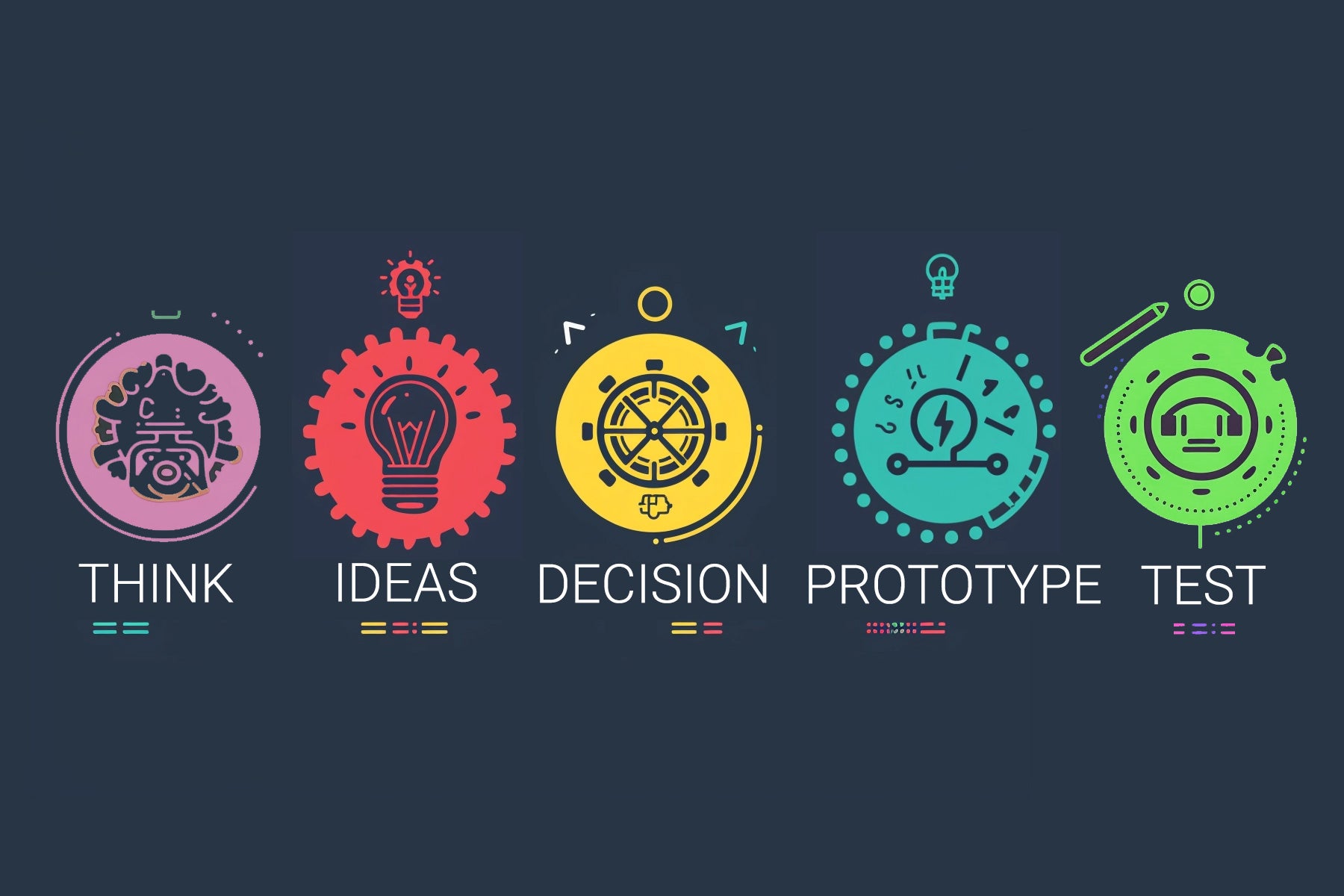Purpose
In this team building exercise, the group must work together to handle toxic waste symbolised by an object. Many areas can be explored in this exercise including leadership, problem solving, teamwork, communication skills and attention to detail. You can easily adjust the difficulty level of this exercise by varying the type of equipment used or changing a number of parameters as described in the Variations section below.
Objective
Transport toxic waste from one location to another and neutralise it.
What You Need
- Several golf balls. This represents the toxic waste.
- Ropes.
- You need two 10m pieces of ropes for marking areas.
- More rope can be provided as supplies.
- Two cans. You can use empty cans of Pringles or those used to pack tennis balls.
- String. These can be used as supplies by the team.
- Scissors.
- Bicycle rubber tube.
- A fairly large area. You can also carry out this exercise outdoors.
- Blindfolds.
Setup
- Mark two circles on the floor with two ropes. Make each circle about 3m in diameter and allow 4m distance between them.
- Place one empty can at the centre of one circle. Place another can with several golf balls in it at the centre of the other circle.
- Explain that the task is to move the container of toxic waste from one circle to the other while observing safety regulations. They must then place the contents of the can into the empty can to neutralise the toxic waste.
- The safety regulations are as follows:
- If the toxic waste is dropped it can lead to a nuclear chain that will destroy you and the city you are in.
- All personnel must keep a safe distance of 1.5m from the toxic waste.
- Anyone who breaches this safe distance will be radiated and his participation level will be affected.
- If part of a body breaches the area, it becomes dysfunctional.
- Provide the equipment to the team.
- Use the following guidelines while monitoring the team’s activities:
- There is a lot of temptation to get closer to the toxic waste. Start with warnings about breaching the safe distance so delegates can have a chance to learn the game. If repeated, issue statements such as:
- You cannot use your hands anymore.
- You have radiated your legs and cannot use them anymore.
- You have radiated your head:
- You have lost your eyesight (provide blindfolds which the person should wear for the rest of the game).
- You have lost your voice and cannot talk to others.
- You have radiated your whole body and unfortunately cannot participate in the task anymore (unless the game is reset and everyone starts from the beginning).
- If the toxic waste is dropped, everyone dies. Reset the exercise and get them to start from the beginning.
- There is a lot of temptation to get closer to the toxic waste. Start with warnings about breaching the safe distance so delegates can have a chance to learn the game. If repeated, issue statements such as:
- Allow 5 to 10 minutes for planning and preparation.
- Allow 20 minutes for them to carry out the task.
- Once completed, congratulate them and then follow with a discussion.
Timing
Explaining the Exercise: 5 minutes
Activity: 10 min planning + 20 min activity = 30 minutes
Group Feedback: 10 minutes
Discussion
- Did you nominate a leader to coordinate your activities?
- Did you utilise every team member’s specific skills and talent?
- Did everyone have a chance to contribute, in particular if they are naturally quieter?
- Were you happy with the way the team completed the task?
- What would you do differently if you had another chance?
- What areas of the exercise did you find most challenging and why?
Variations
To change the difficulty levels of this exercise consider the following:
- Set a time limit. If the team doesn’t complete the task within a given time, the toxic waste will explode. Time pressure can make the task a lot more difficult, requiring improved dexterity, teamwork, communication and planning.
- Use alternative supplies. You can bias the exercise towards problem solving rather than coordination. Use only one golf ball. Provide a ring instead of the bicycle tube. Use a ring with a hole that is smaller than the golf ball so the golf ball can be placed on top of it. Place the empty cans upside down. Place the golf ball on top of one of the cans. Explain that the team must use a mechanism to pick up the single golf ball and carry it to the other zone and place it on top of the other empty can to neutralise it.
- Use multiple attempts. This biases the exercise towards control, coordination and execution of a plan. Place three cans in the centre of the toxic area and explain that they must carry all three to the other side, possibly one after the other.
- Run the exercise with two competing teams. Rather than time pressure, use competition to create pressure. Split the group into two and provide two identical sets of equipment. Use two pairs of zones to keep all activities separate. The group that completes the task first wins.
Comments
By Chelsea Elm @ Monday, September 1, 2014 9:02 PM
Question:
Is there somewhere I can read the suggested "solution" to this team building activity.
It would help as the facilitator for me to know how to solve this challenge.
Answer:
Thanks for the question. As with many such exercises, the aim is to simply get a group of delegates work together towards a solution. The solution is not as important as their approach. In addition, you can easily adjust the difficulty level of the exercise as well as the solution by providing different kinds of materials as supplies. For example with supplies such as rubber tube and string, one solution is to wrap the can with the tube tightly. The tube has to be made in the right shape outside the zone and then lowered on top of the can. Several strings are attached to the tube which are held by several people. This allows them to lower the tube together on top of the can, tighten it to hold it and then lift it to move to another area. There may be more solutions depending on supplies provided.
Soft Skills Training Materials
Get downloadable training materials
Online Train the Trainer Course:
Core Skills
Learn How to Become the Best Trainer in Your Field
All Tags
Training Resources for You

Course Design Strategy
Available as paperback and ebook

Free Training Resources
Download a free comprehensive training package including training guidelines, soft skills training activities, assessment forms and useful training resources that you can use to enhance your courses.

Our Comprehensive Guide to Body Language

Train the Trainer Resources
Get Insights - Read Guides and Books - Attend Courses
Training Materials
Get downloadable training materials on: Management Training, Personal Development, Interpersonal Development, Human Resources, and Sales & Marketing














Leave a comment
All comments are moderated before being published.
This site is protected by hCaptcha and the hCaptcha Privacy Policy and Terms of Service apply.